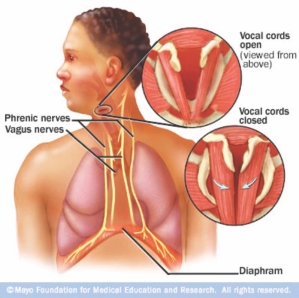Health
How to Get Rid of Persistent Hiccups
Sandra Ketcham
 Hiccups occur when an involuntary spasm of the diaphragm, which is the muscle between the abdomen and the chest, causes a sudden closure of the vocal cords. They are very common and affect most people at some point in life, according to the Mayo Clinic. Most cases of hiccups are triggered by eating a large meal, drinking alcohol or carbonated beverages, temperature changes or emotional excitement. Nerve disorders, metabolic disorders and certain drugs are other possible causes. According to CIGNA, persistent hiccups are those that last for more than two days.
Hiccups occur when an involuntary spasm of the diaphragm, which is the muscle between the abdomen and the chest, causes a sudden closure of the vocal cords. They are very common and affect most people at some point in life, according to the Mayo Clinic. Most cases of hiccups are triggered by eating a large meal, drinking alcohol or carbonated beverages, temperature changes or emotional excitement. Nerve disorders, metabolic disorders and certain drugs are other possible causes. According to CIGNA, persistent hiccups are those that last for more than two days.
Step 1
Try home remedies to get rid of your hiccups. Breathing into a paper bag, taking magnesium antacids, holding your breath and then drinking a glass of water, or having someone scare your hiccups away are commonly used home treatments for hiccups. The Carl R. Darnall Army Medical Center also recommends counting backwards from 100, tickling the roof of your mouth, or blowing up a balloon.
Sponsored Links:
Cure Herpe Symptoms Finally, there's a real solution All Natural Cure.
www.cureherpesymptoms.com
 Step 2
Step 2
Take medication to treat hiccups that last longer than two days and fail to respond to home remedies. Drugs, such as chlorpromazine, metoclopramide and baclofen, can help relax the diaphragm and alleviate persistent hiccups, according to the Mayo Clinic.
Step 3
Visit your doctor for a massage of the carotid sinus in your neck. This technique involves gentle stroking of the carotid artery that lies in your neck near the angle of your jaw. Shands Medical Center warns against attempting this massage technique at home.
Step 4
Stop persistent hiccups associated with a distended abdomen by undergoing a procedure in which a nasogastric tube is inserted through your nose to release trapped air.
Step 5
Try a nerve block to get rid of hiccups that fail to respond to medications and home remedies. According to the Mayo Clinic, this procedure involves the injection of an anesthetic into your phrenic nerve.
Step 6
Speak with your doctor about vagus nerve stimulation (VNS). In VNS, a device is surgically implanted into your chest to deliver electrical stimulation to your vagus nerve. VNS is traditionally used as a treatment for epilepsy, but it may be effective at treating persistent hiccups that fail to respond to other treatment options.
Step 7
Treat any underlying medical conditions that may be responsible for your hiccups. CIGNA states that persistent hiccups may be a sign of a potentially serious underlying medical condition, such as pneumonia, gastroesophageal reflux, uremia, pancreatitis, cancer or pleurisy of the diaphragm.
source: www.livestrong.com

